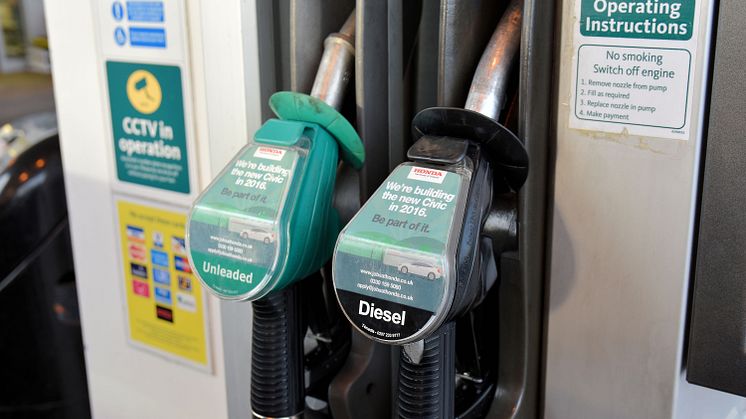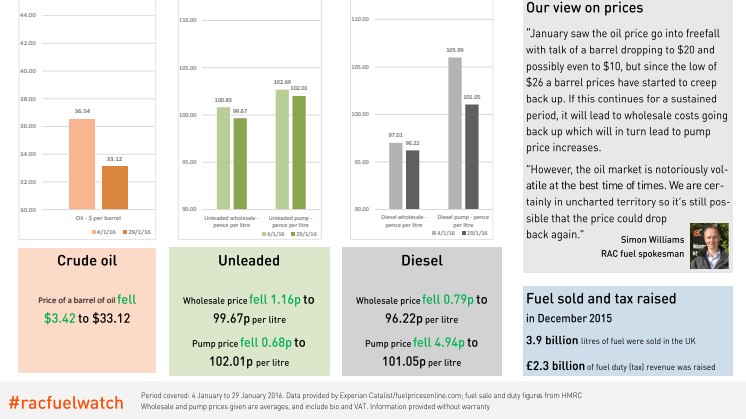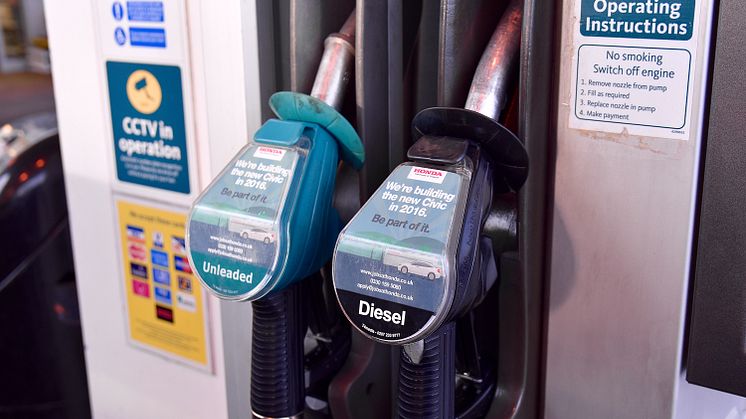
Press release -
Price of fuel may have reached low point for now, warns the RAC
- Average price of diesel falls by 5p a litre in January saving £2.72 a fill-up
- Petrol price falls for seventh month in a row
- Oil reaches $26 a barrel – lowest price for 12 years but is showing possible signs of recovery
Motorists should make the most of petrol being under £1 while it lasts as data from the RAC Fuel Watch January report suggests the cheap fuel market may have bottomed out.
Since oil reached a 12-year low of $26 on Wednesday 20 January ($25.73 – 27 August 2003) the barrel price has rebounded, finishing the month at $33.12, only $3 below where it started at $36.54. This has caused the wholesale cost of both petrol and diesel to rise again, although diesel still remains 3p a litre cheaper than unleaded.
January was nonetheless a landmark month for diesel with 5p a litre coming off the average pump price as a result of the supermarkets first cutting to 99.9p a litre and later to below 98p. This led to an average petrol-diesel price flip on Monday 25 January with diesel becoming cheaper than unleaded (101.18p diesel v 101.86p petrol) – the second time in six months, the previous time being 29 July 2015 which lasted for nearly two months.
At the start of the year an average litre of diesel cost UK motorists 105.99p, but by the close of January this had fallen to 101.05p; in contrast petrol only fell from 102.69p to 102.01p, albeit its seventh consecutive monthly drop. As a result of the average 5p a litre diesel price reduction, the cost of filling a 55-litre family car came down by £2.72 to £55.58. While this impressive monthly reduction is causing the average price of diesel to move ever closer to the £1 milestone, early signs of an oil price recovery may prevent this happening.
At the end of November, the RAC signalled that drops in the wholesale price of diesel suggested an opportunity for a significant drop in retail diesel prices and supermarkets reacted particularly positively to the situation and dropped their average prices by 6.5p from 104.41p at the start of the month to 97.96p by the close. There was no change with supermarket unleaded prices – staying at an average of 99.87p throughout January.
RAC fuel spokesman Simon Williams said: “Motorists have seen petrol and diesel prices reach their lowest points since 2009. January saw the oil price go into free fall with talk of a barrel dropping to $20 and possibly even to $10, but since the low of $26 a barrel the market has started to creep back up. If this continues for a sustained period, wholesale costs will rise further which will in turn lead to pump price increases.
“However, the oil market is notoriously volatile, even in more stable economic times, so it’s still possible that the price could drop back again. And, even if there is a rise in the oil price, it seems unlikely that it will be drastic as OPEC seems set to continue producing more oil than is demanded to retain its market share. While there has been talk of a production cut, the market has yet to see evidence of this.
“The other factor which is not helping the situation from a motorist’s perspective is the fact that the pound has weakened significantly against the dollar from $1.47 at the beginning of January to $1.42 by the end. This has undermined some of the benefit of the falling oil price and, with oil traded in dollars, this could prove to be even more harmful if the pound continues to lose value against the dollar while the oil price goes up.”
HM Revenue and Customs data for December 2015 shows combined sales of petrol and diesel were 1.8% down on November at 3.938bn litres but 0.4% up on December 2014. More petrol was used in December 2015 than in the previous month – 1.458bn litres compared to 1.437bn; this was also a 0.8% increase on December 2014. Diesel usage, however, fell month on month by 3.7% from 2.574bn litres in November to 2.480bn in December, but was unchanged year on year. Sales of both petrol and diesel in December netted the Treasury £2.282bn in fuel duty revenue.
Motorists can keep abreast of the latest fuel prices by visiting: www.rac.co.uk/fuelwatch or following #racfuelwatch on Twitter.
Related links
Topics
Categories
Notes to Editors
About the RAC
With more than eight million members, the RAC is one of the UK's most progressive motoring organisations, providing services for both private and business motorists. Whether it's roadside assistance, insurance, buying a used car, vehicle inspections and checks, legal services or up-to-the-minute traffic and travel information – the RAC offers a solution for all motoring needs. The RAC is committed to making motoring easier, safer, more affordable and more enjoyable for drivers and road users.
The RAC is the motorist’s champion and campaigns to support the interests of its members and UK motorists at a national level, including advancing levels of road safety, supporting the needs of young drivers and voicing concerns about the increasing cost of motoring. The RAC’s annual Report on Motoring – first published in 1989 – provides a clear insight into the concerns and issues facing today’s motorists.
For the very latest news on UK fuel prices, check RAC Fuel Watch or follow #racfuelwatch on Twitter. This is a comprehensive guide to the latest UK unleaded petrol and diesel prices – both at the wholesale level and at the pump. RAC Fuel Watch analyses how prices changed through the previous month and compares the most recent prices with those from three, six and 12 months before.
Key facts:
- RAC patrols fix four out of five vehicles at the roadside and on average within 34 minutes
- RAC vans carry more than 500 parts and tools to get members’ vehicles going again
- 98% of members would recommend RAC Rescue to their friends and family



